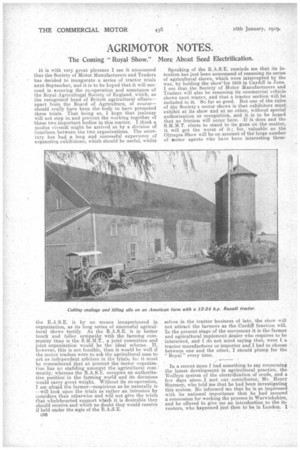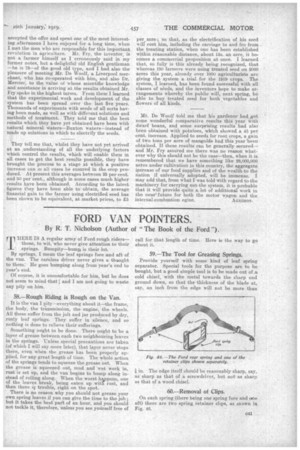AGRIMOTOR NOTES.
Page 16

Page 17

If you've noticed an error in this article please click here to report it so we can fix it.
The Coming "Royal Show." More About Seed Electrification.
It is with very great pleasure I see it announced that the Society of Motor Manufacturers and Traders has decided to inaugurate a series of tractor trials next September, and it is to be hoped that it will succeed in securing the co-operation and assistance of the Royal Agricultural Society of England, which, as the recognized head of British agricultural affairs— apart froth the Board of Agriculture, of course— should really have been the body to have promoted these trials. That being so, I hope that jealousy will not step in and prevent the working together of -these two important bodies in this matter. I think a modus vivendi might be arrived at by a division of functions between the two organizations. The secretary has had a long and successful experience of organizing exhibitions, which should be useful, whilst
the R.A.S.E. is by no means inexperienced in organization, as its long series of successful agricultural shows testify. As the R.A.S.E. is in better touch and fuller sympathy with the farming community than is the S.M.-M.T., a joint committee and joint organization would be the ideal scheme. If, however, this is not feasible, then it would be well if the motor traders were to ask the agricultural man to act as independent arbiters in the trials, foe it must be remembered bat at present theniotor organization has no stahding amongst the agricultural corn-' munity, whereas the R.A.S.E. occupies an authoritative position in the farming_ world and its decisions would carry great weight. 'Without its co-operation, I am afraid the farmer—suspicious as he naturally is —will look upon the trials as rather an intrusion by outsiders than otherwise and will not give the Oats that wholehearted support which it is desirable they should receive 'andwhich no doubt they would receive if held under the tegis of the R.A.S.E.
oaS
Speaking of the R.A.S.E. reminds me that its intention has just been announced of resuming its series of agricultural shows, which were interrupted by the war, by holding the show"f or 1910 in Cardiff in June. I see that the Society of Motor Manufacturers and Traders will also be resuming its commercial vehicle shows next winter, and that a tractor section will be included in it. Bo far so good. But one of the rules of the Society s motor 'shows is that exhibitors must exhibit at its show and at no other, without special authorization or recognition, and it is to be hoped that no friction will occur here: If it does and the S.M.M.T. elects to stand to its guns on the matter, it will get the worst of it ; for, valuable as the Olympia Show will be on account of the large number of rotor agents who have been interesting them
selves in the tractor business of late, the show will not attract the farmers as the Cardiff function will. In the present stage of the movement it is the farmer and agricultural implement dealer who requires to be interested, and I do not mind saying that, were I a tractor manufacturer or importer and I had to choose between one and the other, I should plump for the " Royal" every time.
In a recent issue I had something to say concerning the latest development in agricultural practice, the Wolfryn system of the electrification of seeds, and a few days since.. I met our contributor, Mr. Henry Sturmey, who told me that he had i
been nvestigating this system. He informed me that he is so impressed with its national importance that he had secured a concession for working the process in Warwickshire, and he offered to give me an introduction to the inventors, who happened just then to be in London. I accepted the offer and spent one of the most interesting afternoons I have enjoyed for a long time, when I met the men who are responsible for this important revolution in agriculture. Mr. Fry, the inventor, is not a farmer himself as I erroneously said in my former notes, but a delightful old English gentleman —he is 78—of the good old type, and I had also the pleasure of meeting Mr. De Woolf, a Liverpool merchant, who has co-operated with him, and also Dr. Mercier, to the value of whose scientific knowledge and assistance in arriving at, the results obtained Mr. Fry Spoke in the highest terms. From them I learned that the experimental work and development of the system has been spread over the last five years. Thousands of experiments with seeds of all sorts having been made, as well as with-different solutions and methods of treatment. They told me that the best results which they have yet obtained have been with natural mineral waters—Buxton waters—instead of made up solutions in which to electrify the seeds.
They tell me that, whilst they have not yet arrived at an .understanding of all the underlying factors which control the results, which will enable them in all cases to get the best results possible, they have brought the process to a stage at which a positive increase can in all cases be ensured in the crop produced. At present this averages between 25 per cent. and 50 per cent., although in some cases much higher results have been obtained. According to the latest figures they have been able to. obtain, the average financial gain to the farmer using electrified seed has been shown to be equivalent, at market prices, to £.5 per acre; so that, as the electrification of his seed will cost him, including the carriage to and fro from the treating station, when one has been established within reasonable distance, about 15s. an acre, it becomes a commercial proposition at once. I learned that, so fully is this already being recognized, that whereas 150 farmers were using treated seed on 2000 acres this year, already over MO agriculturists are giving the system a trial for the 1919 crops. The system, I learned, has been found successful with all classes of seeds, and the inventors hope to make arrangements whereby the public will, next spring, be able to buy treated seed for both ,vegetables and 'flowers of all kinds.
Mi. De Woolf told me that his gardener had, got some wonderful comparative results this year With dwarf beans., and some surprising results had also been obtained with potatoes, which showed a 48 per cent. increase. Applied to seeds for root crops, a gain of two tons per acre of mangolds had this year 'been obtained. If these results can be generally secured— and Mr. Fry assured me there was no reason whatever why this should not be the case—then, when it is remembered that we have something like 28,000,000 acres under cultivation in this country, the aggregate iperease of our food supplies and of the wealth.to the nation if universally adopted, will be immense. I may add that, from what I was told with regard to the machinery for carrying out-the system, it is probable that it will provide quite a lot of additional work in the near o future for both the motor wagon and the internal-combustion egine. AGRIMOT.






















